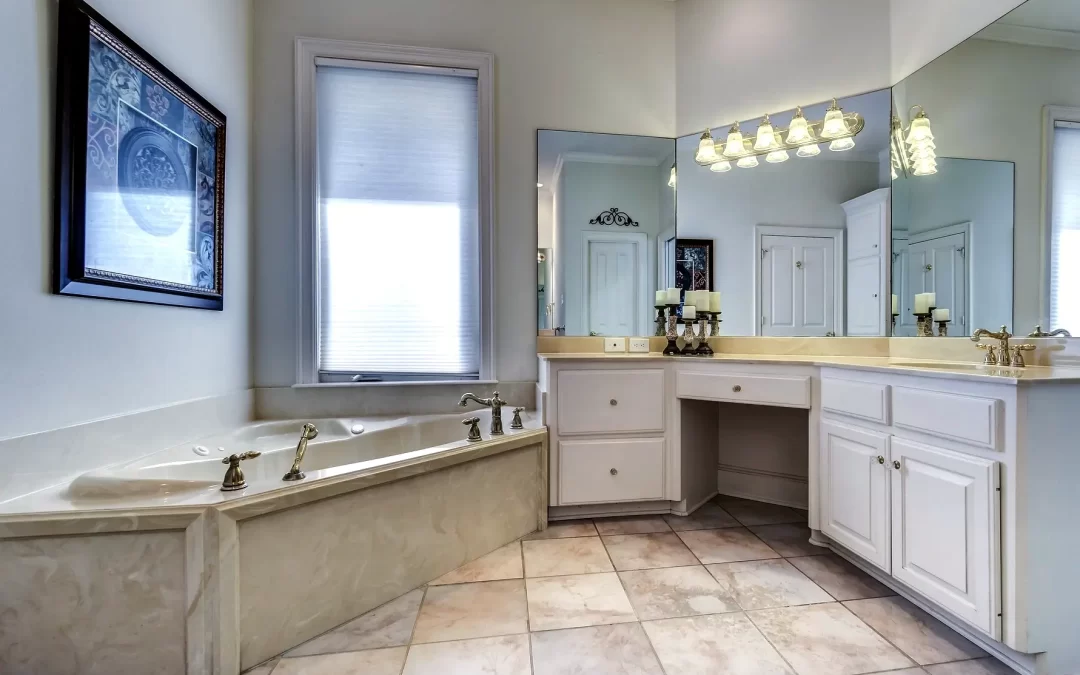When renovating your bathroom, selecting the right flooring is an important decision that affects the aesthetics and functionality of the space. Understanding the available options available is necessary when planning to update the bathroom. Here are a few of the most popular and reliable bathroom flooring materials. Each offers unique benefits and will set the stage for your bathroom’s design.
Types of Flooring Materials for the Bathroom
Sheet Vinyl
Sheet vinyl makes a fantastic option for bathrooms due to its impermeability. This material comes in large sheets for a virtually seamless installation, significantly decreasing the chances of water seeping through gaps. Easy maintenance and ample design choices make sheet vinyl appealing to homeowners who value practicality and style.
Luxury Vinyl for Bathroom Flooring
Luxury vinyl is a powerhouse when it comes to bathroom flooring options. Its resilience to water and moisture makes it a prime candidate for damp and humid environments. Luxury vinyl comes in a range of styles and patterns, including varieties that mimic the look of wood or stone, providing elegance without the hefty price tag. Additionally, the comfort underfoot and the ease of installation have made luxury vinyl a favorite among homeowners.
Porcelain Tile
Porcelain tile offers classic appeal and has been a go-to choice due to its durability and water resistance. Porcelain’s density makes it less likely to absorb moisture, which is non-negotiable in a humid bathroom. Its variety in colors, textures, and sizes allows homeowners to personalize their space while benefiting from a long-lasting, low-maintenance surface.
Ceramic Tile
Ceramic tile offers a cost-effective solution without compromising on style. It shares many of the advantages of porcelain, such as water resistance and a wide range of design options. However, it is generally less expensive, making it ideal for homeowners working within a budget who want to achieve a high-quality look.
Stone Flooring Materials for the Bathroom
For those seeking luxury and natural beauty, stone flooring stands unmatched. Materials like marble, granite, and slate elevate a bathroom into a spa-like sanctuary. While stone flooring presents an upscale look, it is costly and requires sealing to protect against moisture. Stone is also cold underfoot and sometimes slippery.
Stained Concrete
Stained concrete offers a sleek, modern appeal. Its durability and the ability to withstand damp conditions make concrete a practical alternative for bathroom flooring. The staining process allows homeowners to customize the appearance with colors and finishes, making each floor unique. When opting for concrete, it’s important to consider the hard surface may require rugs to enhance comfort.
Selecting the right flooring material for your bathroom involves weighing the pros and cons of each option. As a homeowner, consider the look and feel you desire, along with durability, safety, and maintenance. To ensure the best results, consult professionals who can provide insights tailored to your situation. Flooring transforms a bathroom from the ground up, and with the right choice, you can enjoy both a practical and inviting space.
FAQs
How is porcelain different from ceramic tile?
Porcelain and ceramic tiles are both made from clay, but porcelain tiles are denser and more durable than ceramic tiles. Porcelain tiles are fired at higher temperatures and have a lower water absorption rate, making them highly resistant to water and stains. They are suitable for indoor and outdoor use and are often used in high-traffic areas like bathrooms due to their durability.
Are there eco-conscious options for bathroom flooring?
Yes, there are several eco-conscious options for bathroom flooring. Some popular choices include bamboo, cork, reclaimed wood, recycled glass tiles, and linoleum. These materials are renewable, recyclable, or made from recycled materials, making them more environmentally friendly than traditional flooring options.
Can I install bathroom flooring myself, or should I hire a professional?
DIY installation depends on your skills and the flooring you select. Some materials, such as luxury vinyl tile (LVT) or laminate, are relatively easy to install and may be suitable for DIY installation. However, ceramic tile and natural stone are best left to the pros. They have the knowledge and experience to ensure proper preparation, placement, and sealing, especially in wet areas like bathrooms.
What type of bathroom flooring is easiest to clean?
Vinyl flooring is often considered one of the easiest-to-clean options for bathrooms. It is water-resistant, durable, and relatively low maintenance. Regular sweeping and occasional mopping with a mild cleaner is usually sufficient to keep vinyl flooring clean.
Are specific flooring materials better suited for homes with young children and elderly family members?
For homes with young children and elderly family members, prioritize safety and comfort. Non-slip materials like textured ceramic or porcelain tiles, vinyl, and rubber flooring are excellent options for traction, reducing the risk of slips and falls. Luxury vinyl and cork offer cushioning and warmth underfoot, making them comfortable for children and elderly individuals.
Rhode Island Real Estate Inspection Services offers professional inspection services to homebuyers and sellers in Rhode Island. Contact us to request an appointment.

